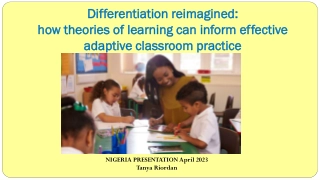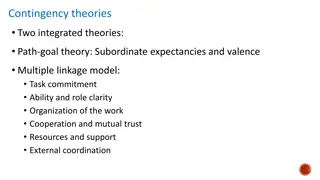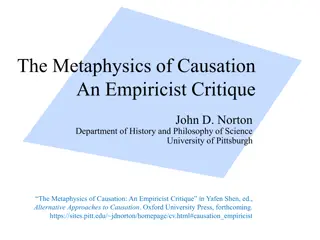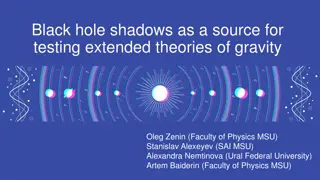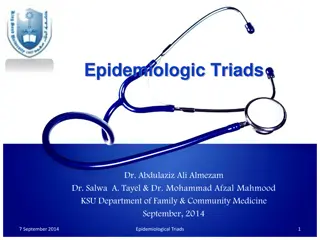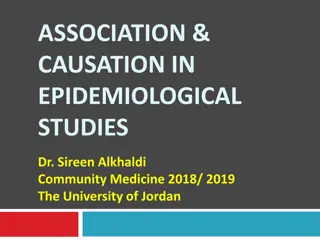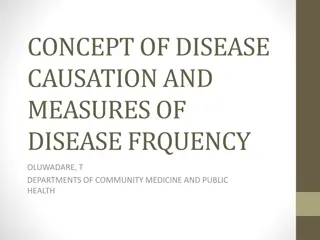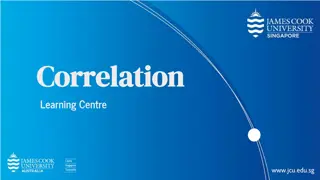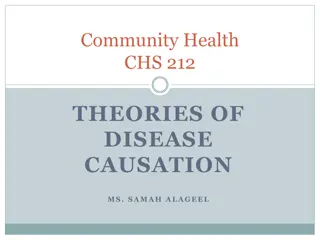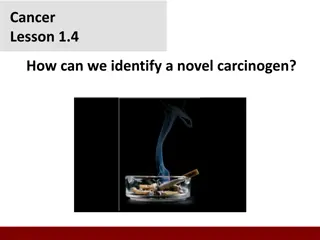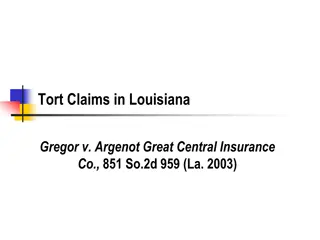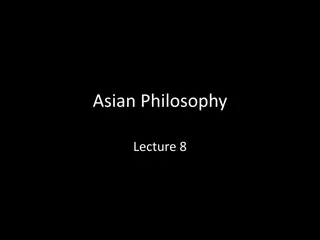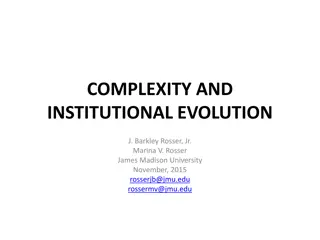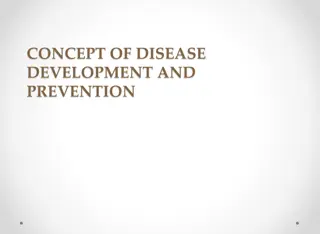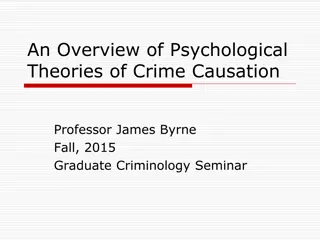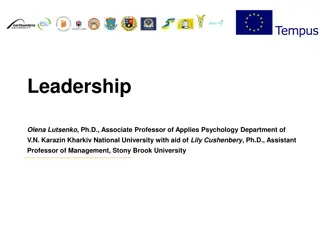Reimagining Differentiation: Enhancing Classroom Practice Through Learning Theories
Explore how theories of learning can inform effective adaptive classroom practice, focusing on the concept of differentiation. The presentation delves into reimagining differentiation, key theories supporting it, and practical strategies to support differentiation in language classrooms. The researc
0 views • 35 slides
Leadership Theories and Power Dynamics in Organizations
Explore contingency theories, dyadic theories, power and influence concepts, and leadership lessons from "12 Angry Men". Dive into the significance of leader-member exchange (LMX), political skills, and the interplay between power, politics, and organizational efficiency.
0 views • 27 slides
Critique of Causal Metaphysics and Empiricism
In this content, the author critiques the metaphysics of causation from an empiricist perspective, exploring the limitations of empiricism in understanding the contingent truths of the world. It discusses causal antifundamentalism, various forms of skepticism, including Humean skepticism, and challe
4 views • 55 slides
Theories Explaining Deviant Sexual Behavior Throughout History
Explore historical theories on deviant sexual behavior, including demonological, anomie, psychoanalytical, human ecology, and somatotyping theories. These theories range from supernatural beliefs of possession to scientific interpretations of societal influences and individual characteristics.
2 views • 33 slides
Testing Extended Theories of Gravity Using Black Hole Shadows
Exploring the shadows of black holes as a method to test extended theories of gravity, this study discusses the existence of black holes, gravitational wave astronomy, and direct imaging. Researchers Oleg Zenin, Stanislav Alexeyev, Alexandra Nemtinova, and Artem Baiderin present findings on black ho
5 views • 18 slides
Understanding Epidemiologic Triads in Disease Causation
Epidemiologic triads are essential models for studying disease causation, with a focus on descriptive and analytical epidemiology. By exploring factors such as person, place, time, agent, host, and environment, researchers can identify key relationships in the spread and prevention of diseases. The
2 views • 24 slides
Understanding Association and Causation in Epidemiological Studies
Exploring the concepts of association and causation in epidemiological studies, this content delves into the complexities of determining if exposure leads to disease risk. It discusses different types of associations, such as spurious, indirect, and direct causal associations, illustrating the chall
5 views • 43 slides
Psychological Theories of Criminality: Understanding the Roots
Psychological theories of criminality delve into the association between intelligence, personality, learning, and criminal behavior. Major theories include Psychodynamic Theory by Freud, Behavioral Theory by Bandura, and Cognitive Theory by Kohlberg. These theories explore how unconscious mental pro
1 views • 20 slides
Exploring Leadership Theories: Traits and Behaviors
Leadership theories have evolved from trait theory focusing on personal qualities to behavioral theories emphasizing actions and interactions. While early research sought universal traits for leadership, it encountered challenges due to varied traits among leaders and non-leaders. Behavioral theorie
2 views • 29 slides
Understanding the Significance of Exposure in EEOICPA Procedures
Delve into the complexities of exposure assessment in the context of EEOICPA procedures, examining the nuances of significant exposure levels and their impact on causation determination. Explore proposed recommendations for refining exposure assessment metrics to enhance causation evaluation.
0 views • 9 slides
Understanding Disease Causation and Frequency Measures
The concept of disease causation delves into the factors that play a role in the development of diseases, emphasizing the importance of studying causation for prevention, control, and treatment. To infer causation, certain conditions must be met, and a causal relationship is characterized by associa
0 views • 47 slides
Understanding Correlation and Causation in Data Analysis
A correlation analysis assesses the relationship strength and direction between two variables using the Pearson correlation coefficient. It's crucial to differentiate between correlation and causation, where correlation indicates a relationship but not causation. Exploring examples like ice cream sa
0 views • 13 slides
Theories of Disease Causation and Historical Perspectives
Explore the evolution of disease causation theories from miasma theory to germ theory, epidemiological models, and the socio-environmental approach. Understand the definition of disease, its causes, and how ancient beliefs in spiritual or mechanical forces led to new scientific interpretations.
0 views • 30 slides
Unraveling COVID-19 Conspiracy Theories and Hoaxes
Exploring various conspiracy theories surrounding the origins of COVID-19, from bat soup to bioweapons and espionage. Dive into wilder theories involving population control, world war, and even Disney's supposed predictions. Understand the differences between conspiracy theories and hoaxes, shedding
2 views • 11 slides
Understanding Sociological Theories and Frameworks
Sociological theories, encompassing micro and macro perspectives, provide a lens to interpret societal dynamics. Consensus theories like functionalism emphasize shared norms, while conflict theories such as Marxism highlight social inequalities. Social action theories like interactionism focus on in
3 views • 21 slides
Online Seminar: Theories of Learning in Initial Teacher Education
This collection of online seminar slides introduces pre-service teachers to major theories of learning, including the Science of Learning through cognitive neuroscience. The presentation aims to help educators consider implications for teaching, recognize theories in action, and pose critical questi
1 views • 11 slides
Understanding Carcinogens and Causation in Cancer Research
Exploring the identification of novel carcinogens and proving causation in cancer research through examples like the Ames test, Koch's postulates, and distinguishing between causation and correlation. The challenges in attributing cancer causation and the importance of conclusive evidence for behavi
1 views • 16 slides
Theories of Causation in Psychological and Social Sciences
Overview of theories of causation categorized into psychological, social psychological, and sociological perspectives. Psychological theories focus on instinctive, biological, and psychological qualities of abusers, including Attachment Theory, Psychodynamic Theory, Social Learning Theory, and Situa
0 views • 15 slides
Introduction to Quantum Chromodynamics & Field Theories in High-Energy Physics
Explore the fundamentals of Quantum Chromodynamics and Classical Field Theories in this informative lecture, covering topics such as global and local symmetries, Lagrangians, actions, and dynamics. Understand the significance of global and local symmetries in classical field theories, along with exa
2 views • 17 slides
Comprehensive Overview of Student Affairs Theories
This collection explores key theories in student affairs, including cognitive-structural theories, learning theories, and person-environment theories. Cognitive-structural theories delve into how individuals process information, while learning theories examine how people absorb knowledge. Person-env
3 views • 19 slides
Understanding Theories and Concepts in Research
The content delves into the fundamental concepts of theories and variables in research. It discusses the nature of theories, including descriptive, explanatory, and predictive theories. Additionally, it examines the role of concepts in providing identity and meaning to objects and phenomena. Through
2 views • 55 slides
Classical Trade Theories and Their Limitations in International Economics
Classical trade theories such as the Theory of Absolute Advantage by Adam Smith and the Theory of Comparative Advantage by David Ricardo highlight the benefits of free trade and specialization based on natural advantages. However, these theories have limitations, such as the inability to explain sce
0 views • 8 slides
Understanding Professional Duties in Accountancy
This informative content discusses various aspects of professional duties in accountancy, such as negligence, breach of duty of care, causation, asset valuation, and ethics. It covers topics like duty of care, foreseeability test, breach of duty standards, causation principles, and the accountants'
1 views • 10 slides
Applying Theories and Models in Integrated Health: Module 3 Overview
This module delves into the application of various theories, perspectives, and practice models in integrated healthcare. Students will learn to utilize different theories to enhance their understanding and practice in integrated health, focusing on aspects like personal impact, behavioral change the
0 views • 78 slides
The Grim Reaper Paradox: A Metaphysical Inquiry into Time and Causation
Exploring the intriguing Grim Reaper paradox and its implications on the necessity of finitude in time and causation, this content delves into various philosophical arguments surrounding the concept of infinity and the nature of existence. Through detailed analyses of different paradoxes and argumen
0 views • 33 slides
Understanding Murder in Common Law
Murder, as defined in common law, is the unlawful killing of a human being with malice aforethought. This act involves both actus reus (unlawful killing caused by the defendant) and mens rea (intention to kill or cause grievous bodily harm). Legal causation, including thin skull test, chain of causa
0 views • 18 slides
Accelerating Lemma Learning Using Joins in Satisfiability Modulo Theories
Explore the use of joins in accelerating lemma learning within the context of Satisfiability Modulo Theories (SMT). The study covers various SMT applications at Microsoft and delves into the development of the Z3 solver. Key topics include theories, arithmetic operations, array theory, uninterpreted
0 views • 25 slides
Unraveling the Impact of Misinformation on Society
Delve into the complex web of factors contributing to misinformation in today's society, with a focus on the role of platforms like Facebook in spreading fake news and manipulating public opinion. Explore the challenges of testing empirical theories and understanding causation in an age where online
0 views • 16 slides
Overview of Tort Claims in Louisiana regarding Raw Oyster Consumption
Exploring the legal aspects of consuming raw oysters in Louisiana, this content delves into tort claims, the standards for oysters, state warnings, the required posting of warnings, and specific details from the case Gregor v. Argenot Great Central Insurance Co., shedding light on plaintiff's claims
0 views • 9 slides
Theories and Concepts in Semantics: Classical vs. Prototype Approaches
Explore different theories of concepts in semantics, including classical theories based on necessary and sufficient conditions, causal theories, and prototype theories. Compare their strengths and limitations in handling fuzziness, asymmetry, and internal structure of concepts. Discover how experime
1 views • 46 slides
Exploring Sankhya Philosophy: Metaphysical Dualism and Causation
Delve into the ancient Sankhya philosophy, the oldest school of Indian philosophy founded by Kapila. Discover its metaphysical goal of avoiding monistic materialism and idealism, leading to a dualism between nature and spirit. Explore the concepts of Prakriti (Nature) and Purusha (Self), along with
0 views • 38 slides
Integrating Theories and Models for Enhanced Health Practice
Explore the application of theories, perspectives, and practice models in integrated health through Module 3. Learn how theories guide assessment, treatment, and patient outcomes. Discover common theories enhancing assessment and supporting individuals through grief and loss. Gain insights into the
0 views • 78 slides
Exploring Time and Change in Philosophy: Possible Worlds and Causation
Dive into the intriguing concept of time without change in the philosophical discourse presented by Cathy Legg from the University of Waikato. Delve into the Regularity Theory of Causation, examining the close relationship between time and change, challenges to traditional views, and the possibility
0 views • 27 slides
Comprehensive Overview of Leadership Theories and Styles
Leadership encompasses the ability to influence a group towards achieving goals by knowing oneself, communicating vision, building trust, and taking effective action. Various leadership styles include Autocratic, Democratic, Free-Rein, and Paternalistic, each with distinct decision-making approaches
0 views • 19 slides
Complexity and Institutional Evolution in Economics
This paper explores the relevance of complexity theory in studying economic institutional evolution, focusing on the concepts of cumulative causation, increasing returns, and hierarchical emergence. It discusses the dynamic and computational complexity theories, highlighting the role of systems foll
0 views • 24 slides
Understanding Disease Development and Prevention
Explore the theories of disease development, the concept of the iceberg phenomenon, and the significance of prevention, control, elimination, and eradication in managing diseases. Learn about historical and modern theories, including the germ theory, epidemiologic triad, and the web causation model.
0 views • 21 slides
Understanding Correlation and Causation
Explore the concepts of correlation and causation through various scenarios such as handwashing and sickness, wearing a favorite football jersey and winning games, or memorizing study guides for tests. Distinguish between correlation and causation with thought-provoking examples like ice cream sales
0 views • 14 slides
Psychological Theories of Crime Causation: An Overview
Psychological theories of crime causation explore factors such as psychological development, childhood experiences, socialization, and individual characteristics that contribute to criminal behavior. These theories delve into the influence of mental disorders, personality traits, and psychoanalytic
0 views • 16 slides
Understanding Liability in Negligence: Remoteness and Causation
Explore the concept of legal causation in negligence cases by delving into the tests for establishing remoteness. Dive into landmark cases like Re Polemis & Furness, Withy & Co Ltd. [1921] and Overseas Tankship (UK) Ltd v. Morts Dock and Engineering Co Ltd or (Wagon Mound) (No. 1) [1961] to understa
0 views • 12 slides
Understanding Leadership Theories and Styles
Leadership involves influencing a group towards a common goal. Traits, interaction styles, and group dynamics play vital roles in effective leadership. Various theories, such as Trait Theories and Synthetic Leadership Theories, provide insights into different aspects of leadership. Understanding lea
0 views • 41 slides
